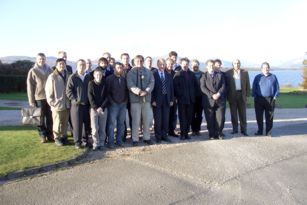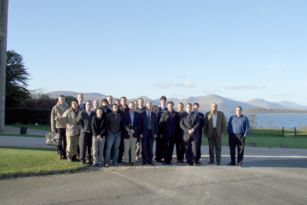Project News
(Latest items appear first)
Project Workshop, University of Lancaster, 8th July 2008
The project held a workshop on 8th July 2008 at the University of Lancaster. Topics discussed at the workshop included:
- goal-directed system management
- assessing benefits of condition monitoring
- fault detection through condition monitoring
- communications system architecture
- sensor node processor design
- middleware design
Project Workshop, University of Lancaster, 19th March 2008
The project held a workshop on 19th March 2008 at the University of Lancaster. Topics discussed at the workshop included:
- system integration
- gearbox fault detection
- design of a universal communications module
- node hardware design
Project Workshop, University of Stirling, 18th December 2007
The project held a workshop on 18th December 2007 at the University of Stirling. This meeting focused in detail on:
- goals and policies for sensor network management
- assessing cost benefits for condition monitoring
- distributed fault detection of wind turbine defects
- middleware for sensor networks
- design of a universal communication manager for sensor networks
- acoustic techniques for monitoring wind turbine blades
- design of a sensor network processing node
PROSEN at New Technologies for Distributed Systems Conference, 6th June 2007
Project member Ken Turner presented Stirling work on PROSEN at the New Technologies for Distributed Systems conference in Marrakech. See the article for an explanation of how policies are being used to manage wind farms.
PROSEN at European Wind Energy Conference, 10th May 2007
Project member David McMillan presented his work on PROSEN at the European Wind Energy Conference in Milan.
Project Workshop, University of Lancaster, 25th April 2007
The project held a workshop on 25th April 2007 at the University of Lancaster. This meeting focused in detail on:
- the overall PROSEN system architecture
- integrating policy-based management with sensor monitoring
- monitoring wind farms for assessing economic performance
- hardware support for adaptive condition monitoring
- blade sensors
- a second generation processing node
Project Workshop, University of Strathclyde, 19th December 2006
The project held a workshop on 19th December 2006 at the University of Strathclyde. This meeting focused in detail on:
- various generations of the processing node architecture
- the hardware, software and communications architectures
Project Workshop, University of Kent, 11th-12th September 2006
The project held a workshop from 11th to 12th September 2006 at the University of Kent. The topics formally presented included:
- policies for condition monitoring
- validation procedures for condition monitoring benefit models
- communications architecture
- hardware support for adaptive condition monitoring of sensors
- acoustic sensors
- weather sensors
Project Workshop, University of Stirling, 30th-31st March 2006
The project held a workshop from 30th to 31st March 2006 at the University of Stirling. A wide variety of topics was covered, including:
- policy-based management
- quantification of condition monitoring benefits for wind turbines
- low-level learning in sensor arrays
- decision support and fault diagnosis
- wireless sensor networks
- flexible hardware architectures
- wind turbine sensors.
PROSEN at Science, Engineering And Technology Event, 13th March 2006
Project member David McMillan exhibited his work on PROSEN at a Science, Engineering And Technology Event. This was part of the UK National Science Week. See David's poster for an overview of his work on condition monitoring and operational management of wind-power plant.
Project Workshop, Ross Priory, 15th-16th November 2005
The project held a workshop on 15th and 16th November 2005 at Ross Priory. An extended presentation was given by project leader, Prof. Ian Marshall. This was followed by in-depth discussion of issues and priorities, leading to a shared view of the project approach.
Short presentations were given by all partners on their technical background and aspirations for the project. This was very useful in allowing all project members to understand how the various teams will collaborate. Input from the industrial partners was particularly relevant and helpful.
Project members then split up into work area discussions. More detailed plans were elaborated for work over the next four months.
Photographs of the project team appear below. Click on an image to see a larger version.






